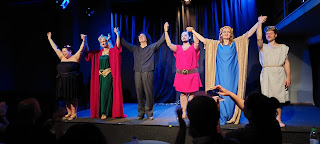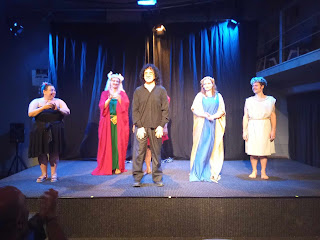On a dull Friday night out from my room that once displayed inspiring sceneries, I collected my energy for a theatrical event, one that seemed more esoteric than theatrical. Invited by a poetess friend of mine, I had no hesitation to decline such greatness. The mirror numbers bespoke of an auspicious, siren-like evening. Luckily, and as I foretold, the stage-play was more than inspiring.
Prometheus Bound is an Opera by the Greek composer Panagiotis Karousos based on the ancient Greek poet Aeschylus' play about the Titan who gave the flame of knowledge to mankind, provoking the anger of Zeus who didn't believe that man could be trusted with fire or was worthy of certain knowledge.
The stage was shared by four talented opera singers who created a Hellenic atmosphere that matched the ancient tales that were in this piece displayed. There was a fiery air of connectivity between the audience and the actors. The small number of comers made the event more intimate in its nature, offering the observers an inward trip without external disturbances. The performance of the actors was of high professionalism imbued with a seemingly strong passion for their roles. The level of their talent was way above the dark neighbourhood in which the event was set, offering the middle class comers a scene that surpassed the recent prestigious performances that the dandy in me never failed to attend.
The cast of characters comprised of the tormented Io, played by dramatic soprano Irini Konsta, who made her entrance dreadfully and unexpectedly, immersed fully in her character, displaying most modernly the anger of a woman who ends up lonesome after a heartfelt love affair. Irini Konsta's Io was a revelation. Her dramatic soprano voice, both powerful and plaintive, captured the tragic beauty of her cursed existence. Transformed into a hybrid of a cow and a human by Hera’s jealousy, Io’s torment was palpable. Konsta’s performance was a delicate dance of vulnerability and strength, her voice soaring with desperation and hope. It was in her aria, a haunting lament of love and loss, that she truly shone, her voice cutting through the silence like a beacon in the dark.
Preceded by Io the audience witnessed Titan Prometheus, played by George Housakos, sentenced by Zeus to eternal punishment for bringing mankind fire. The actor's baritone voice, rich and resonant, conveyed a profound sense of suffering and resilience. Each note he sang was imbued with the weight of his eternal punishment and the unwavering conviction of his gift to mankind. Housakos’ portrayal was a masterclass in vocal artistry, his every gesture a testament to Prometheus' unyielding spirit.; this bold talented lad knew how to celebrate the noble masculine anger that is the modern heir in spirit to the sentiment of a man facing challenges in life that limit his high potential; losing his evolution in a state of sorrow, combined with the pride of what a man has accomplished before his downfall.
Thirdly, my favorite character: Hermes, portrayed by Stefanos Kaltsis, alongside his roles as Ocean and Hephaistos, delivered a versatile and dynamic performance. His tenor voice, bright and expressive, captured the multifaceted nature of the gods he embodied. As Hermes, his delivery was sharp and commanding, a stark contrast to the benevolent Ocean and the conflicted Hephaistos. Kaltsis’ ability to navigate these distinct characters with such finesse was a testament to his extraordinary talent.
Hlín Leifsdóttir, as Oceanid, brought an ethereal grace to the stage. Her high dramatic-coloratura soprano voice was a pure, crystalline force that uplifted and consoled. Oceanid's role, akin to a guardian angel, was rendered with a compassion and warmth that felt almost divine. Leifsdóttir’s vocal agility and emotional depth breathed life into the character, making her a source of solace and strength for both Prometheus and Io. Her interactions with the other characters were a dance of empathy and encouragement, her voice a soothing balm amidst their suffering.
Central to this magnificent production was the pianist Christiana Manou, whose performance was nothing short of sublime. Her fingers danced across the keys with an elegance and precision that breathed life into Karousos' score. Manou's interpretation of the music was both powerful and nuanced, capturing the emotional depth and complexity of the opera. Her playing not only supported the singers but also added a layer of richness and texture to the performance, making the music an integral character in its own right. The passion and artistry she brought to the piano were evident in every note, making her the true heartbeat of the evening. Her performance was a testament to her extraordinary talent and deep connection to the music, leaving a lasting impression on all who were fortunate enough to witness it.
Panagiotis Karousos, the visionary composer behind "Prometheus Bound," crafted a score that magnificently bridged the ancient and the modern. His music, infused with the timeless ethos of Greek tragedy, resonated with profound emotional depth and intellectual vigor. Karousos’ genius lay in his ability to transform Aeschylus' ancient verses into an evocative, living tapestry of sound. His compositions, rich and textured, brought the myth to life, each note a brushstroke painting the eternal struggle between mankind and the gods. Karousos’ masterful orchestration underscored the opera’s dramatic arcs, making the music an indispensable character in this timeless tale. His passion for Greek heritage and his innovative musical language rendered "Prometheus Bound" a transcendent experience, deeply moving and universally resonant.
The minimalist stage, adorned with costumes inspired by ancient Greece and the mythological artistry of sculptor Georgios Roussis, provided a stark yet poignant backdrop for the unfolding drama. The ornate headpieces and flowing garments evoked a sense of timelessness, grounding the myth in its ancient origins while allowing the story to resonate with contemporary relevance. This sculptor brought an extraordinary level of artistry to the production. His designs, inspired by ancient Greek mythology, were not merely costumes but wearable sculptures that enhanced the visual storytelling. Each piece he created was a testament to his deep understanding of both classical art forms and contemporary aesthetics. Roussis’ work seamlessly blended the past with the present, contributing to the opera’s timeless atmosphere. His attention to detail and creative vision elevated the characters, making them appear as if they had stepped out of a mythological tableau.
In the final, climactic scene, as Prometheus beseeched humanity to wield knowledge with love, the opera’s message reverberated with an urgent clarity. His plea, a haunting reminder of the perils of unbridled knowledge, echoed through the theatre, leaving us with the profound realisation that enlightenment, divorced from compassion, is but a hollow victory. As the final notes faded and the curtains drew to a close, the audience remained entranced, the weight of Prometheus' struggle lingering in the air. "Prometheus Bound" was not merely an opera; it was a timeless journey, a profound reflection on the essence of knowledge and the eternal dance between power and love. It left us contemplating our place in this age-old narrative, forever bound by the flames of Prometheus' gift.
https://anissbenarrioua.wixsite.com/blog/post/prometheus-bound-a-three-of-cups-in-display
SOURCE: https://anissbenarrioua.wixsite.com/blog/post/prometheus-bound-a-three-of-cups-in-display










.jpg)



Δεν υπάρχουν σχόλια:
Δημοσίευση σχολίου